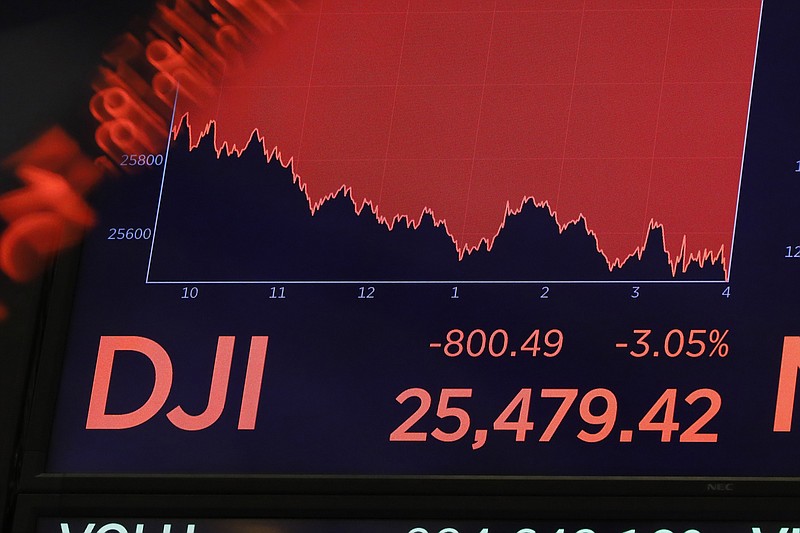After two years of whipping up a frenzy that President Donald Trump conspired with Russians to win the 2016 election, Democrats were crushed when the Mueller report exonerated him.
After months of cooking up the idea of federal government giveaways to Americans in housing, education, energy and health care, 2020 Democratic presidential candidates have learned those ideas aren't so popular across the electorate.
After four years of demonizing candidate Trump and then President Trump over his inelegant remarks, Twitter twaddle and unconventional behavior, Democrats realize voters will accept that from a man who seems to be doing their bidding.
But now, they hope, they've hit on the right poison - convincing Americans we're heading for a recession.
Who wants one of those, after all? The last one resulted in fundamental changes in the U.S. economy. Businesses realized they could do more with less. Workers who kept their jobs got saddled with more work and no more pay. Individuals' 401k's were partially depleted. The then-president said slow growth was the country's future.
But the country now has enjoyed a record 122 months of economic expansion, beginning in June 2009 and accelerating in many ways after Trump became president. So we should be due for a recession, right?
That's exactly what Democrats want you to think.
Add the fact Wall Street had a downturn last week, the fact the short-term bond market looks more attractive than the long-term market and the breathless panicking about the president's trade confrontations with China. They must be signs a recession is coming, right?
Suddenly, Democratic presidential candidates have picked up that mantra, and their national media cohorts are playing along. The hashtag "#TrumpRecession" abounds on Twitter, and references to "Trump slump" are growing.
"I've been saying for about two years - that I hope we have a recession," Bill Maher, left-wing host of HBO's "Real Time with Bill Maher," said recently, "and people get mad at me."
Not surprisingly, the New York Times News Service offered an analysis the Times Free Press ran on Sunday headlined "What to fear in coming months: How recession could happen."
Most national media, Maher and The New York Times are virulently anti-Trump and are likely to go to any lengths to seed his defeat next November. Since nothing else has worked to sour conservative voters on him, the recession scare might do it.
Democrats would bank on, even cheer on, a short-term recession - the kind that defeated President George H.W. Bush in 1992 - if it ensured a defeat of the president.
But how much is hype and how much forecasts the real thing? If we could answer that, we would be working on Wall Street or for the Federal Reserve Board. And, clearly, even they can't predict exactly what will happen.
Hear's what we do know:
In July, consumer spending - two-thirds of the economy - went up (more than in June). The economy added 164,000 jobs, moving the labor force to a record high 163.4 million. New data showed workers' earnings jumped 4.5% in 2017 and 5% in 2018, higher than previously reported and well above inflation.
Sales at Walmart, the country's largest employer, went up during the month, and the company revised its profit forecast up. The Federal Reserve Bank of Atlanta revised its economic growth predictions up, and forecasting firm Macroeconomic Advisers did the same. The Small Business Optimism Index of the National Federation of Independent Businesses also increased during July, and its "Uncertainty Index" fell (reversing a June increase).
National unemployment remains at a 50-year low, and unemployment for black and Hispanic workers is at all-time lows. Inflation also remains low.
"The average worker is working, getting paid more," Brian Moynihan, CEO of Bank of American, recently said in a Bloomberg Television interview. "That's going to translate into good credit performance on the consumer side. The real risk for the U.S. economy is if the consumers slow down."
What would cause them to slow down, to stop buying and investing, to hoard their money? An avalanche of doom-and-gloom talk from 2020 Democratic presidential candidates, that's what.
So far, nothing else has worked for them. In fact, after their first two rounds of candidate debates, pundits began talking about a potential Trump win of massive proportions in 2020 and a GOP recapturing of the U.S. House.
We don't believe it's wise for either side to predict 15 months ahead of the election what might happen, no matter what the tea leaves say.
But we do think the economy is the Democrats' next Russian conspiracy. If Trump voters don't buy it, as they didn't the Russian hoax, the country is likely to continue expanding.
